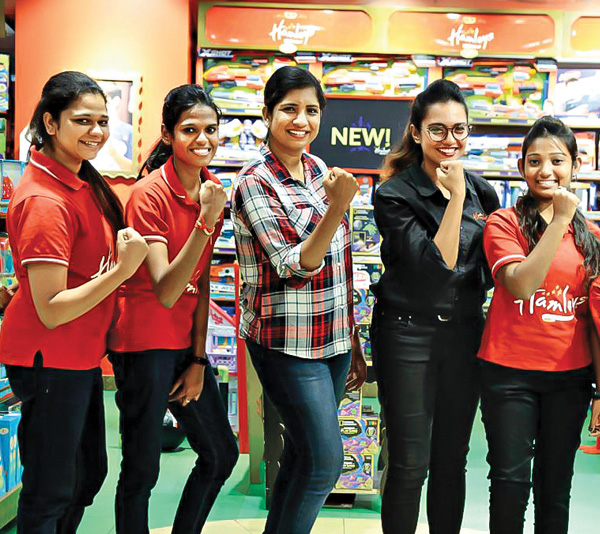Material Issues
Reliance has always strived to address issues concerning its stakeholders and the growth of its businesses. The Company consistently works towards creating a long-term value for all its stakeholders by responding to their needs and expectations.
Materiality is principle that determines which topics or issues directly or indirectly impact an organisation’s ability to create value for all stakeholders and stay competitive. The Company conducts in-depth materiality assessment at defined intervals to identify the topics that are pertinent to its business and stakeholders. At Reliance, materiality assessment entails finding and evaluating a wide range of potential economic, environmental, and social issues that could impact the Company’s performance and its stakeholders and then prioritising them into important material topics.
Approach towards Materiality
Reliance operates in dynamic environments, and the assessment of material topics is an ongoing process that helps the Company in prioritising the topics depending on its criticality. Reliance conducted a materiality assessment for the listed entity during FY 2021-22. The selection of material topics involved identifying probable material issues considering international reporting standards and the priorities of peers. Subsequently, key internal and external stakeholders that have an impact and influence on Reliance were identified for the materiality assessment. Inputs of the identified stakeholders on the probable material issues were captured through relevant stakeholder engagement mechanisms. A detailed analysis of each probable material issue was undertaken, considering the inputs of stakeholders and management. Further, the material topics were prioritised considering both management and stakeholder perspectives.

Methodology
Peer
Benchmarking
Identified a list of industry peers as well as international standards viz. GRI and SASB and conducted a benchmarking for material topics.
Identification of important stakeholders
Identified key internal and external stakeholder groups for RIL and communicated with them regarding the materiality assessment exercise.
Key external stakeholder groups identified
- Shareholders/ Investors
- Government regulators
- Customers
- Employees
- Local communities
- Suppliers
- NGOs
Stakeholders' survey for determining the impact of probable material topics
Created questionnaires for relevant stakeholder groups and collected response from each stakeholder group.
Internal Stakeholder Questionnaire
Comprehensive questionnaire divided into 3 parts:
- Part A: Prioritising identified stakeholders
- Part B: Prioritising enlisted business impacts
- Part C: Rating Material Topics
External Stakeholder Questionnaire
- Short questionnaire for rating of enlisted material topics
Evaluation of stakeholder perception of Reliance’s impact with respect to material topics
Collated stakeholders' responses and carried out a detailed analysis of the responses.
Prioritisation of material topics for RIL
Created a prioritised list of material topics based on the results of the analysis. These topics will be considered as material for RIL.

Through the focused materiality assessment process, RIL has identified the following key issues that are material to the growth of the Company and the well-being of all its stakeholders.
Matrix

Natural Capital
Human Capital
Manufactured Capital
Intellectual Capital
Financial Capital
Social and Relationship Capital
Risk Management
Governance
- Climate change
- Managing Environmental Impacts
- Energy Efficiency of operations
- Water and effluent management
- Raw material security
- Ecosystem and biodiversity
- Innovation and Technology
- Waste management & Circular economy
- Sustainable supply chain management
- Disaster Preparedness and Management
- Health, safety and employee well-being
- Diversity and inclusion
- Customer Satisfaction
- Data privacy and cybersecurity
- Security and Asset management
- Talent Management
- Community Development
- Labour Management
- Human Rights
- Business Ethics, Integrity and Transparency
- Regulatory issues and compliance
- Grievance Redressal Mechanisms
- Risk Management
- Economic Performance
- Code of conduct
Environment
Why the issue is material to Reliance
Climate Change
With the increasing awareness around climate change, it is crucial for Reliance to address the challenges by taking conscious efforts to ensure that the Company continues to respond to the issues arising out of climate change and develop a pathway to decarbonise its operations.
Managing Environmental Impacts
Being a company with a vision to contribute materialy to the future of India, it is critical for Reliance to continue its environmental management efforts that are aimed at creating positive impacts and minimising negative impacts that may result from unpredictable spills or unmanaged GHG emissions.
Energy Efficiency of Operations
While the world is moving towards optimal eco-efficiency, it is important that Reliance manages its raw material and assets in the most efficient manner to generate superior returns while reducing carbon footprint through its energy efficient operations.
Water and Effluent Management
Water availability and accessibility are key concerns. Being a responsible corporate, Reliance needs to map and manage the water used across its operations and ensure that the consumption is socially equitable and environmentally sustainable.
Raw Material Security
Efficient reuse of materials to minimise dependency on raw materials and predicting future requirements is essential for Reliance to ensure raw material security and efficient consumption.
Ecosystem and Biodiversity
Ecosystem and biodiversity loss can have a grave impact on a company’s reputational risk. Hence, it is important that Reliance continues its conscious efforts to ensure proper care is being taken by the Company to preserve flora and fauna within its geographical scope.
Waste Management & Circular Economy
In a decade where waste management is a critical issue and moving towards a circular economy can be an alternative, it is critical for Reliance to continue innovating its processes to materialise its vision of scaling up the recycling of its materials and maximising circularity across the value chain.
Sustainable Supply Chain Management
With its extensive supplier footprint spread across the globe, it is important for Reliance to address the issues of quality, safety, environmental impacts, and social aspects such as human rights and fair wages.
Disaster Preparedness and Management
With the criticality of climate change impacts being manifested in unpredictable weather patterns, cyclones, droughts, and downpour, it has become important for Reliance to continue its endeavours in planning, organising, coordinating, and implementing measures for the prevention and mitigation of disasters.
Social
Why the issue is material to Reliance
Innovation and Technology
To meet the needs of its stakeholders and achieve consistent growth, it is critical for Reliance to strengthen its innovation capabilities and leverage cutting-edge technologies to remain relevant in the ever- evolving macro-economic environment.
Health, Safety, and Employee Well-being
Employee health and safety is a non- negotiable aspect for Reliance to ensure that its human capital is provided with a working environment that places utmost emphasis on their mental and physical well-being.
Diversity and Inclusion
For Reliance, it is essential to promote a progressive and inclusive workplace that onboards people from diverse backgrounds and provides them meaningful growth opportunities, thereby resulting in organisational growth.
Customer Satisfaction
To remain competitive in a fast-changing business environment, it is important for Reliance to position itself as a customer- focused organisation by offering them a wide range of choices, outstanding value proposition, and unmatched experience across all its business segments.
Data Privacy and Cybersecurity
To protect its businesses, customers, infrastructure, and internal users from security threats, it is critical for Reliance to focus on data privacy and cybersecurity by implementing measures and strengthening its systems and processes.
Security and Asset Management
Security and asset protection is an essential aspect for Reliance to ensure safety of all its assets and reliability in operations.
Talent Management
To strengthen its talent pool, it is critical for Reliance to invest in uninterrupted growth and development, which is supported by meaningful engagement activities and learning opportunities.
Community Development
Being a responsible organisation, community development is an indispensable aspect for Reliance. It is essential for the Company to continue implementing community-facing programmes that can benefit society and result in true economic growth.
Labour Management
As a people-centric entity, managing and maintaining cordial labour relations is important for Reliance to ensure that the needs and rights of its entire workforce are addressed.
Human Rights
To ensure ethical conduct, it is important for Reliance to confirm that all its businesses comply with the applicable national and local laws surrounding human rights and implement measures to avoid incidents of human rights violations.
Governance
Why the issue is material to Reliance
Business Ethics, Integrity and Transparency
At Reliance, ethics and integrity have always been the key values that have enabled the organisation to gain stakeholder trust and build a strong reputation. These aspects are critical for Reliance to ensure that the organisation conducts business in an ethical and transparent manner to remain successful over the long run.
Regulatory Issues and Compliance
Compliance is the foundation to build the reputation of the Company. It is crucial for Reliance to continue to ensure regulatory compliance to build trust among its stakeholder groups while also ensuring that its operations are in line with relevant and applicable laws to avoid legal violations.
Grievance Redressal Mechanisms
Establishing effective grievance redressal mechanisms is essential for Reliance to track the issues raised by stakeholders and take immediate actions to resolve their concerns.
Risk Management
Risk management is of paramount importance for Reliance to ensure that the Company is safe from volatility, the current and emerging risks and uncertainties surrounding its business. Having a robust risk management system and effective monitoring protocols will ensure Reliance continues to manage its existing risks while parallelly identifying any new risks that may impact its ability to create value over the long run.
Economic Performance
The Company’s undeterred focus on financial and operational performance is essential for maximising stakeholder value and ensuring consistent growth of the organisation, year after year.
Code of Conduct
Code of Conduct embodies a company’s vision and mission and defines business practice principles. For an organisation like Reliance, it helps dovetail the Company ethos, set the highest standard of values, and create a healthy business relationship with all stakeholders.